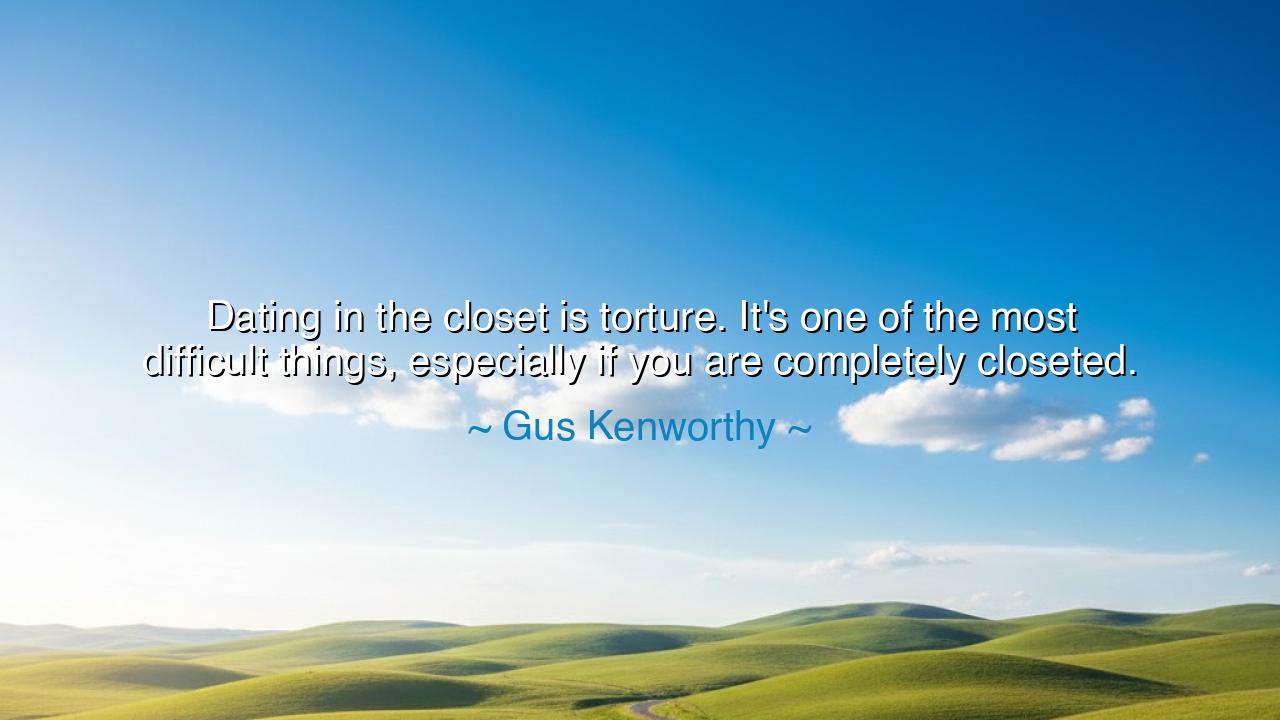
Dating in the closet is torture. It's one of the most difficult
Dating in the closet is torture. It's one of the most difficult things, especially if you are completely closeted.






When Gus Kenworthy spoke the words, “Dating in the closet is torture. It’s one of the most difficult things, especially if you are completely closeted,” he gave voice to a pain both ancient and enduring — the agony of loving in secret, of being unseen and unheard in the truest part of one’s self. His words, though born of modern times, carry the weight of centuries of silence. They are not merely about dating, but about the human yearning for authenticity, and the suffering that comes when truth must hide in shadow. Beneath the surface of his confession lies the universal truth that love cannot flourish without freedom, and that to conceal one’s identity is to wage a quiet war against one’s own soul.
In the ancient world, too, there were those who loved under the cloak of secrecy, for society’s eyes have always been quick to judge what it does not understand. In the courts of emperors, in the academies of philosophers, and in the poems whispered in candlelight, many hearts bore the same weight that Kenworthy describes. To be closeted is to live divided — to offer the world a mask while one’s heart cries out for air. It is to experience love not as liberation, but as torture, a sweetness turned to sorrow by the fear of discovery. The ancients called such a state duality of being — the painful split between who one is and what one must appear to be.
Consider the story of Sappho, the poet of Lesbos, whose verses still echo with longing across millennia. In her words, we hear the ache of forbidden affection, the trembling joy of love that cannot speak its name. “Someone, I tell you, will remember us,” she wrote — a defiant promise that love, even when hidden, leaves a mark upon eternity. Kenworthy’s struggle belongs to this same lineage: the longing not just to love, but to be allowed to love openly, to have one’s truth witnessed without shame. His words remind us that the act of hiding is not safety, but suffering — a slow erosion of spirit that denies the very nature of the heart.
To date in the closet is, as Kenworthy says, to live in contradiction. The moments of affection that should bring light instead deepen the darkness of isolation. Every smile must be cautious, every word measured. What others take for granted — holding a hand, speaking a name, introducing a partner — becomes a labyrinth of fear and secrecy. Such a life requires strength, but it also demands a price: the constant suppression of joy. In this way, his words are not merely a lament, but a warning — that to live without honesty, even for safety, wounds the soul in ways unseen.
Yet, within this confession there also glows a spark of hope — for to name the torture is to begin to end it. By speaking aloud what others could not, Kenworthy transforms silence into courage. His truth becomes a torch for those still wandering in the dark halls of concealment. Like Prometheus stealing fire from the gods, he risks judgment to offer warmth to others. His words tell us that liberation begins not with the world’s acceptance, but with one’s own — the decision to stop apologizing for existence, to stop shrinking for the comfort of others.
The lesson, then, is as ancient as it is urgent: authenticity is freedom, and love demands it. To hide your heart is to bury it alive. No joy, no peace, no relationship can thrive when built upon fear. The ancients taught that to know thyself is the beginning of wisdom; Kenworthy’s teaching adds that to live as thyself is the beginning of peace. When one steps out of the closet — whether in matters of identity, belief, or truth — one begins not just to love others, but to finally love oneself.
So let his words be a call to courage for all who listen: Do not let the judgment of the world dictate the boundaries of your truth. Speak it, live it, and love within it, for no heart was meant to survive in hiding. As Gus Kenworthy reminds us, secrecy is a cage, and truth the key that opens it. Walk into the light of your own honesty — even if trembling, even if uncertain — for that is where love becomes whole. And when you do, you will find that the torture of concealment fades, and in its place rises something far greater: the radiant calm of being exactly who you are.






AAdministratorAdministrator
Welcome, honored guests. Please leave a comment, we will respond soon